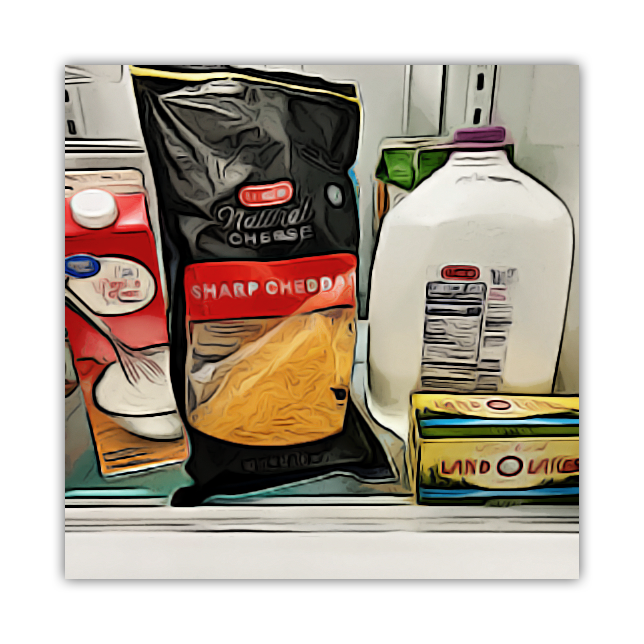Pros And Cons Of Dairy Products
Got milk, milk does the body good, the strong bones campaign, and recently the “drink chocolate milk after you workout” push - milk’s advertising game is brolic like the bones it promises. However, big milk’s great marketing skills haven’t been able to prevent the fire dairy has come under; now the benefits are in question. With these questions “milk” alternatives have popped up all over the map: almond, coconut, rice, soy, and so on. So what’s the truth? Is dairy a delight or a dismay? Should it be retained or replaced? Let's continue.
Pros And Cons Of Dairy Products
What Is Dairy
Despite milk being plastered on many plant products they aren’t dairy, of course, but not even milk for that matter. Unless there are coconut utters I’m unaware of.. I digress.
A dairy product is any food derived from the milk of a mammal. It isn’t limited to cows, yet in the US of A you know how we get down - our dairy is almost exclusively from the moo.
Milk, cheese, ice cream, whey protein, casein protein, cottage cheese, yogurt, butter, cream, and ghee are all considered dairy products.
From this list you can already start to see how wildly variable the potential end results are, from solely sources of dietary fat i.e. ghee to solely sources of protein IE whey.
Note: in America most milk is pasteurized, a process that partially sterilizes to prevent harmful bacteria, so all in this article is reflecting studies, results, and effects of pasteurized dairy.
What Is Lactose Intolerance
Upfront I’ll tell you there are no notable health issues with dairy consumption [1]. There are no unordinary fat loss impediments. There are no hypertrophy roadblocks. Yes there’s more saturated fat with uncut dairy when compared to 2%, fat-free, and skim versions, but regardless saturated fat isn’t the ‘crumbler’ of life it has been deemed to be. You can hormonally benefit from moderate saturated fat, yet if your diet is centered around saturated fatty acids without enough protein, vitamins, and minerals required for decent health and/or to the point of a serious calorie surplus pushing you to obesity you’ll have problems.. As with anything.
To be fit you need a balanced lifestyle with or without milk. To lose fat you need a calorie deficit. To build muscle you need sufficient calories.. All with or without milk.
The most common issue milk does have is lactose intolerance aka lactase maldigestion.
Gather around for story time.
Flashback Friday lands us in Hinesville Georgia.. Where a 20 or 21 year old soldier was getting a little more consistent with his lifts, so his protein intake was rising as a result. This young soldier was a fan of the white mammal liquid, he’d throw it around whenever possible. This particular day he put that liquid in a bowl preceded by the ever-so tasty cinnamon toast crunch and followed by a scoop of vanilla whey protein.
My was he pleased with the tasting.. Initially.
For 20-21 years on earth he hadn’t had a hint of intolerance to anything.. Let alone milk, but 1.5 hours after this delectable concoction that all changed.
Long story less long, that guy was me and my gut felt like it had Jackie Chan in it. I repeated the process a few days later to be sure.. Results were conclusive. I had it bad.
This wasn’t always a problem for me as it usually isn’t a problem for most jacks and jills early on in life.
Lactose intolerance is when your body fails to produce enough lactase, which breaks lactose into the digestible sugars glucose and galactose.
At around 2 years old it’s not uncommon for your body to manifest less and less lactase, because you’re no longer dependent on your mother’s milk, making lactose more and more intolerable.
Symptoms Of Lactose Intolerance
Flatulence, bloating, diarrhea, stomach pain, headaches, and nausea.
All of these outcomes that wreak havoc on your abdomen are from lactose malabsorption. Lactose that fails to be digested enters the colon where bacteria handles the rest.. Not as efficient down there.
The severity of your lactose intolerance determines how impactful the effects are; all those intolerant aren’t equal. 4-6 out of 10 adults fall on the lactose intolerance spectrum.
You’ll be notified swiftly when symptoms sprout, but if you want to know for sure set up a test with your primary physician.
What To Do If You’re Lactose Intolerant
Still if you’re lactose intolerant there are options:
Accept the symptoms and push through
Limit dairy
Avoid dairy
Stick to dairy with limited lactose IE whey and casein protein powders
Use lactose-free dairy
Supplement with lactase tablets, powders, etc. To make up for what you lack
Is It Okay To Consume Dairy Products
The answer is yes. Dairy isn’t the antagonist or protagonist.. It just.. Is. Milk isn’t a member of the dietary justice league, but it isn’t constructed to deter your fitness and health aims either.
Note: even when lactose intolerant you’ll absorb most nutrients milk products provide, yet your carbohydrate (lactose) absorption is hindered, to a degree, so some of the carbs may pass without full digestion.
Types Of Dairy Products
Dairy is about as diverse as a “we are the world” music video. Here are some of the most popular products along with a few pros and cons for each.
Milk
We’ll start with the boss - the base of it all. All else is an offshoot of milk. Milk isn’t protein packed, but the protein content is of high quality sources. 80% casein and 20% whey protein, you can bank the amino acid profile of milk won’t leave you hanging, which is why most supplement companies extract and supply their own concentrated whey and casein powders.
Note: the lactose content in whey and casein is so low you’ll likely have no reaction even if intolerant to lactose; I use both frequently.
Pros:
Sodium to potassium ratio favorable for hydration post-workout
Calcium, magnesium, phosphorus, and vitamin k infused - contributing to bone health
Vitamin d (regulates calcium and contributes to healthy testosterone levels)
Increases insulin growth factor (IGF-1) (anabolic hormone)
Fat content helps stave off hunger
Reliable for vitamin a (vision)
Contains vitamin e (immune system)
Splattered with vitamin b-12 (metabolism)
Comes with testosterone-friendly zinc
Selenium source (thyroid function)
Isn’t shown to cause extra mucus production, despite the rumors [3]
Cons:
Have to limit if lactose gives you trouble
Can be calorically dense, so keep track of your total calorie intake
Cheese
Can’t not like cheese. I have a little obsession with cheese if I’m honest. As a kid I used to lay a slice on a saucer, throw it in the microwave, and eat that bad boy with a fork 😆. It’s good with almost anything: pizza, eggs, burgers, or even alone on a plate.
Pros:
Low carb/keto-friendly
Minimal sugar content
Low glycemic profile
Has a few grams of protein
Vitamin a, b-12, k, d, calcium, selenium, and zinc
May contain stomach-friendly bacteria dependent on the type of cheese
Less lactose than milk
Cons:
Contains lactose
High in sodium, which can be a blood pressure problem if your overall diet puts you in excess without enough potassium and proper overall hydration to clear things up
Note: unchecked sodium can also lead to violent weight fluctuations and flat muscles.
Cottage Cheese
I’m not a big fan of cottage cheese’s taste, but disallow me to be a deterrent. Cottage cheese can have a place for you straight out the canister or as an additive.
Pros:
Slow digesting casein protein source, which is praised for a steady flow of muscle saving amino acids
Source of dietary fats
Helps keep you full
Easy to use
Vitamin b-12, d, calcium, and selenium
Stomach-friendly bacteria
Less lactose than milk
Cons:
Contains lactose
High in sodium
Ice Cream
Two words that bring pleasure and pain. Flavor and adipose tissue when overdone. Satisfying part of a cheat meal, but if you’re in a calorie surplus or not it has a downside.
Pros:
Stupendous flavor
Wonderful cheat meal choice
Calcium and phosphorus
Cons:
Contains lactose
Can be addictive
High sugar content
Calorically dense
Ghee And Butter
Butter is a combination of butter fat and milk solids. Ghee is fat that derives from clarified butter, but is created under conditions that retain nutrients.
Pros:
Testosterone boosting fats
Vitamin a, c, d, k, e, and calcium
Ghee has a high smoke point
Only trace amounts of lactose
Cons:
Can be high in sodium
Yogurt
Yogurt is a unique dish with variant degrees. It can be a carb, protein, or fat source dependent on the version you choose.
Pros:
Versatile
Probiotic properties
Can be friendly on the stomach despite lactose due to good bacteria
Low calories
Calcium, phosphorus, and vitamin d
Cons:
Many sources are sugar laden
The most flavorful brands tend to have the most sugar
My Thoughts
Dairy isn’t the best or worst, it’s just another tool that if used incorrectly can lead to unwanted results. Same as apples, honey, sweet potatoes, and beef burgers. What’s intriguing is that milk’s an easy, reliable way to get your structural buddy calcium and testosterone assistant vitamin d.
When possible always go with organic dairy, for grass-fed cows have higher omega 3 content (benefits of omega 3 fatty acids).
It’s a misnomer when one says “I lost x pounds because I dropped dairy” - dairy wasn’t the problem. The loss of poundage was due to dietary displacement. You may have cut your calories down by replacing dairy with less energy dense foods, but it wasn’t the dairy that was the issue. No matter what foods you consume it’s about being in a caloric deficit for fat loss.
One of the reasons milk gets dinged at the town square is saturated fat, but saturated fat is harmless on its face. The real obstacle is the processed foods that tend to accompany one’s diet that includes a great deal of saturated fat. A lady or gent following a carnivore diet that’s riddled with saturated fat is a lot healthier than one on a vegan diet if your calories aren’t in check, or your sources are heavily processed.
So, It’s About That Time
It’s all about the big picture: what does your diet look like as a whole? Milk won’t make or break it. You shouldn't have nightmares if you’re a regular in the dairy aisle, it’s safe there. If you decide to drop or have been avoiding milk altogether.. Ensure your vitamin d and calcium needs are still being met, it’s often overlooked. Keep those bones strong, diet good, and eyes on the prize by putting those muscles to use. Be Great.
Sources:
[1] Ncbi.Nlm.Nih.Gov/Pmc/Articles/Pmc5122229/



